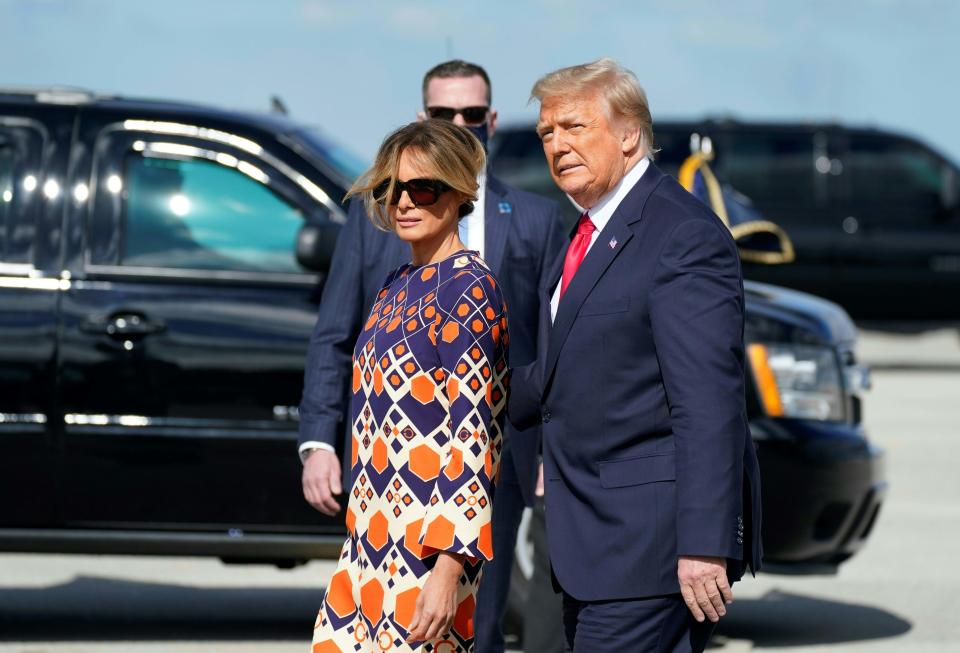The end of Twitter diplomacy: What Joe Biden’s inauguration means for US foreign policy

The Trump era of Twitter diplomacy is over.
No longer will officials in the State Department in Washington be left scratching their heads as they seek to unravel the implications of a dawn tweet which has sent US foreign policy into a spin.
Joe Biden ushers in a return to the rules-based international system at the heart of American foreign policy, whether in confronting security threats such as Iran’s nuclear weapon ambitions, or the existential dangers of climate change.
“Look folks, all my colleagues I serve with in the House and the Senate up here, we all understand, the world is watching, watching all of us today,” he said in his presidential inauguration address on Capitol Hill.
“So here is my message to those beyond our borders, America has been tested and we have come out stronger for it.
“We will repair our alliances and engage with the world once again, not to meet yesterday’s challenges, but today’s and tomorrow’s challenges, and we will lead not merely by the example of our power but by the power of our example.”
Mr Trump tore down diplomatic norms, on North Korea, Nato, Russia, global warming and a string of other issues.
But while his conduct left many people aghast, it did shake up the diplomatic kaleidoscope and had some benefits.
“Sometimes unpredictability keeps the people who aren’t your friends off balance, and that has a utility, but obviously when it’s applied to your friends it works in the opposite direction,” explains Britain’s ambassador to the US Dame Karen Pierce.
She moved to the plum diplomatic post from the role of UK ambassador to the United Nations, an organisation heavily criticised by Mr Trump, alongside the World Health Organisation, Nato and other global bodies.
“I think we will see very early on a very strong commitment from the Biden administration to the rules-based international system,” continues Dame Karen.
“I think we will see in Biden, in the administration, a very strong commitment the UN, to the international financial institutions, to those aspect of the UN like global health and climate.
“Joe Biden has already said he would like to come back into the Paris climate agreement, he wants to come back into the Iran nuclear agreement, and I think we will see a raft of announcements like that then form the ground base to being able to take international co-operation to the next stage.”
Unlike a number of recent US presidents, Mr Trump did not take his country to war.
However, his unilateralist, protectionist, America First approach has meant the US has partially withdrawn its influence abroad, including in parts of the Middle East.

“Donald Trump can certainly claim that he kept America out of new, endless wars,” says Lord Kim Darroch, who was forced out as UK ambassador in Washington in 2019 after his diplomatic cables, scathing about the Trump administration, were leaked.
“There is another side of the argument which is that Syria is now basically dominated by a combination of Russia and Iran.
“He pulled out of the Iran nuclear agreement which damages our security and encouraged Iran to restart its nuclear programme.
“And basically a lack of American leadership internationally has left the field open to Russia and China, the picture is pretty mixed.”
Mr Biden will attend the G7 summit of world leaders in Cornwall in June, and possibly the COP26 climate change conference in Glasgow in November.
There is no time to waste when it comes to tackling the crises we face. That's why today, I am heading to the Oval Office to get right to work delivering bold action and immediate relief for American families.
— President Biden (@POTUS) January 20, 2021
Unlike Mr Trump, he is not expected to storm into global meetings, following a Twitter or media barrage, or leave a trail of outrage.
He will seek to build bridges through multilateralism and take a more diplomatic approach to relationships with traditional US allies including in Nato, which Mr Trump once branded “obsolete”.
On China, Mr Biden is still expected to take a firm stance against unfair environmental and trade practices, but to pursue US goals through trying to establish an international coalition to pressurise Beijing rather than unilateral tariffs.
The 78-year-old Washington veteran does not have his predecessor’s showmanship or instinct for doing the unexpected which, in the case of North Korea, managed to defuse tensions through at times almost surreal meetings with Kim Jong-un, even if they did not force the pariah state to abandon its nuclear weapon developments.
However, Mr Biden’s cross-partisan skills in alliance-building may prove to be a far more powerful weapon in dealing long-term with flashpoints around the world.
A new US ambassador to the UK will also soon move into Winfield House in Regent’s Park, which boast the second-largest private garden in London, after only Buckingham Palace, with 12 acres.
Ardent Trump supporter and NFL tycoon Woody Johnson was sent to the UK as America’s envoy in August 2017 and recently tweeted that he “can’t thank President Trump enough for entrusting me with the Special Relationship”.
Mr Johnson, though, has condemned the “dark day for the United States” of the storming of Capitol Hill on
January 6 by Trump supporters who he says should be “prosecuted to the fullest extent of our law”.
Back in Washington, Dame Karen explains how the mood has swung from alarm and shock at the violence, a subdued feeling with the security clampdown, but now “optimism” as the transition to a new president was taking place.
“The whole of the diplomatic corps is very pleased to see American democracy come out on top,” she said.
Read More
‘Democracy has prevailed’: Biden, Harris sworn in a Trump era ends

 Yahoo Finance
Yahoo Finance 